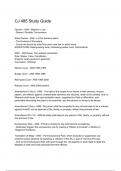CJ 485 Study Guide
Opinion - ANS-- Majority = Law
- Dissent, Plurality, Concurrence
Stare Decisis - ANS-- Let the decision stand
- The Doctrine of Precedent
- Courts are bound by rules from prior case law on same issue.
EXCEPTIONS: Distinguishing facts, Outranking earlier court, Dictum/dicta
IRAC - ANS-Issue: The question presented
Rule: Statue, Case, Constitution
Analysis: Apply general to particular
Conclusion: "Holding"
Warren Court - ANS-1953-1969
Burger Court - ANS-1969-1986
Rehnquist Court - ANS-1986-2005
Roberts Court - ANS-2005-present
Amendment IV (four) - ANS-- The right of the people to be secure in their persons, houses,
papers, and effects, against unreasonable searches and seizures, shall not be violated, and no
Warrants shall issue, but upon probable cause, supported by Oath or affirmation, and
particularly describing the place to be searched, and the persons or things to be seized.
Amendment V (five) - ANS-- No person shall be compelled in any criminal case to be a witness
against himself, nor be deprived of life, liberty, or property, without due process of law.
Amendment XIV (14) - ANS-No state shall deprive any person of life, liberty, or property, without
due process of law
Exclusionary Rule - ANS-- Primary remedy for law enforcement wrongdoing.
- Defendant triggers the exclusionary rule by making a "Motion to Exclude" or Motion to
"Suppress" Evidence
Translation of Mapp - ANS-- The Exclusionary Rule, which excludes or suppresses any
evidence police obtained by exploiting a violation of the 4A, is part of 14A Due Process
- And so the Exclusionary Rule will travel through the 14A pipeline to each state to deter the
illegality of state and local police/government officials.
, 4 Amendments Structure - ANS-- Application: 4A applies to "Search" and "Seizure"
- Violation: 4A prohibits "unreasonable" searches and seizures. Warrant requirement, Probable
cause, Reasonable suspicion.
- Remedy: Fix of Wrong caused by 4A violation
ex: Exclusionary Rule, Civil Suit, Apology
Schmerber v. California - ANS-- The forced extraction and analysis of a blood sample is not
compelled testimony and therefore does not violate the Fifth Amendment privilege against
self-incrimination.
Potential Constitutional issues created are: 14A Due Process, 5A privilege against
self-incrimination, 4A right against unreasonable searches and seizures
To be a "Witness" - ANS-- "Witnesses" "testify" by telling what they know, or "showing the
contents of their minds."
- The 5th Amendment protects persons by preventing the government from forcing them to
divulge the contents of their minds and then using this information against them at trial.
Test #1 if 5A Applies - ANS-- 5th Amendment applies to Testimonial or Communicative
evidence. DOES NOT apply to Real or Physical Evidence.
Testimonial or Communicative Evidence - ANS-- Reveals the thoughts or contents of the mind.
Ex: Forcing the suspect to tell or write out how they committed the crime, where the body was
buried, or what they did with the stolen money.
Real or Physical Evidence - ANS-- Does not reveal contents of the mind.
Ex: Taking samples of blood, hair, DNA, Saliva. Taking photo of suspect, handwriting
Exceptions to "Test/Comm" vs. "Real/Phys" - ANS-- Lie Detector Tests
- "By-products" of compulsions to take the test.
Test #2 if 5A applies - ANS-- "The Cruel Trilemma"
- If the government action forces a person to choose between three bad options, the police have
created a "cruel trilemma."
Cruel Trilemma - ANS-- Forces a defendant into choosing between 3 bad choices.
1.) Self-accusation: "Ok, I did it!"
2.) Perjury: "No, I didn't do it!"
3.) Contempt: Witness - "I will not testify."
Judge then states going to jail for contempt of court in refusing order to testify."
Definition of a 4A "Search" seen in Katz vs US (1967) - ANS-- A "4A Search" is a government
intrusion whether it is Direct or Indirect.




